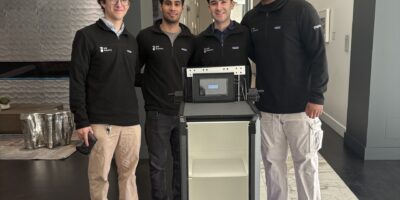It’s always exciting to attend hackathons. There’s a sort of creative tension in the air that you hardly feel anywhere else. You can almost hear the gears whirring in the hackers’ heads as you pass by, as they put their mental energies to use towards troubleshooting that code snippet that suddenly stopped working, prototyping an electrical design that is as efficient as possible with the parts they have on hand, or coming up with a sales pitch that is bound to blow away the competition. Such was the atmosphere last weekend in E5, where Hack the North, a hackathon attracting students from all around the world, was hosted.
For those who don’t know, a hackathon is an event where participants brainstorm, build, and pitch their ideas for solutions to any problem they can imagine. With only 36 hours to develop a competition-ready product, the pressure is on for hackers who, more often than not, get very little sleep. Each product is judged by important guests from the tech world, who are usually founders or CEOs of their own companies.
And important guests there were – Alexis Ohanian, the co-founder of Reddit; Eric Migicovsky, the CEO of Pebble; Steven Woods, the engineering director of Google; and Mike Kirkup, the director of Velocity were only a few of the 18 guests present to judge or to speak at the event. For tech companies, hackathons represent an interesting opportunity to find the most talented hackers, and ultimately to recruit them. Students can also take the opportunity to get in touch with tech industry leaders, such as Google, Microsoft, and Facebook, and secure exciting future job prospects for themselves.
Most students, however, attend hackathons to be able to collaborate with other bright minds on their projects. To help them implement hardware solutions, hackers at Hack the North were given access to a variety of cool gadgets to play around with, including Oculus Rifts, Arduinos, Raspberry Pis, Pebble smartwatches, Myo armbands, Intel Edisons, and drones, only to name a few. Some employees from the companies who attended the hackathon were also going around, helping the hackers with any technical questions they might have had.
With all the support these hackers had access to, you can expect that the hacks they developed during the hackathon’s short 36-hour time period were brilliant. Some of the finalists included an Iron Man-inspired hack that integrates a way to interact with your phone inside a motorcycle helmet, a device that vibrates when a cyclist comes too close to an obstacle, and an app that uses both Pebble and Uber technologies to track how many drinks you’ve had.
I’m personally hoping to see some of these hacks develop into companies. To simplify the transition from hack to viable product, Hack the North has introduced a new prize category this year, presenting a “fellowship for continued learning” to the team whose product shows the most promise two months from now, an idea born of the collaborative spirit of the hackathon. In the words of Kevin Lau, co-founder of Hack the North, “Encouraging collaboration, not competition, is our core value.”




Leave a Reply